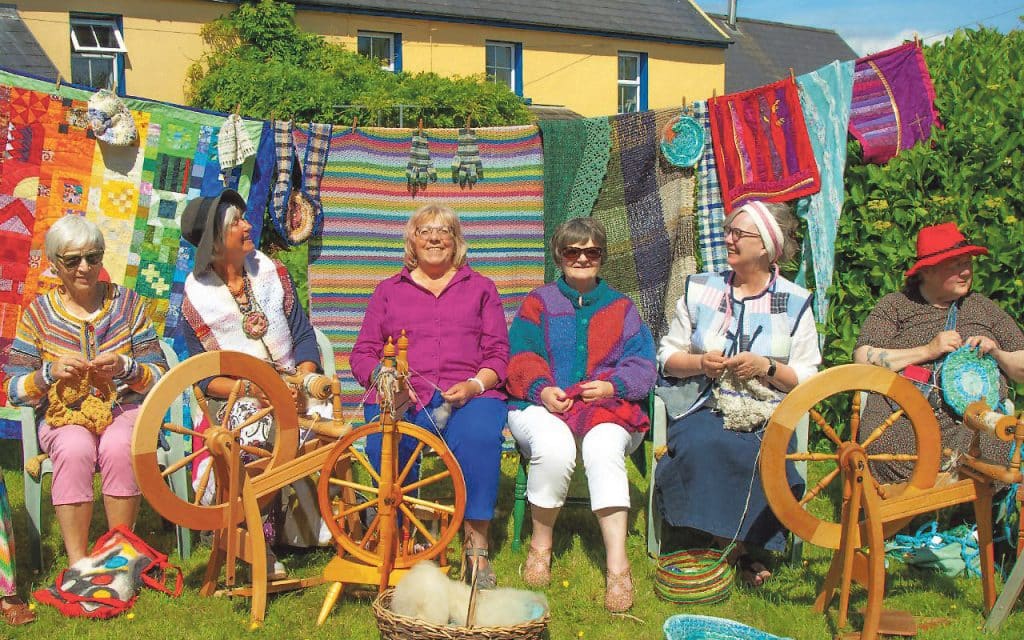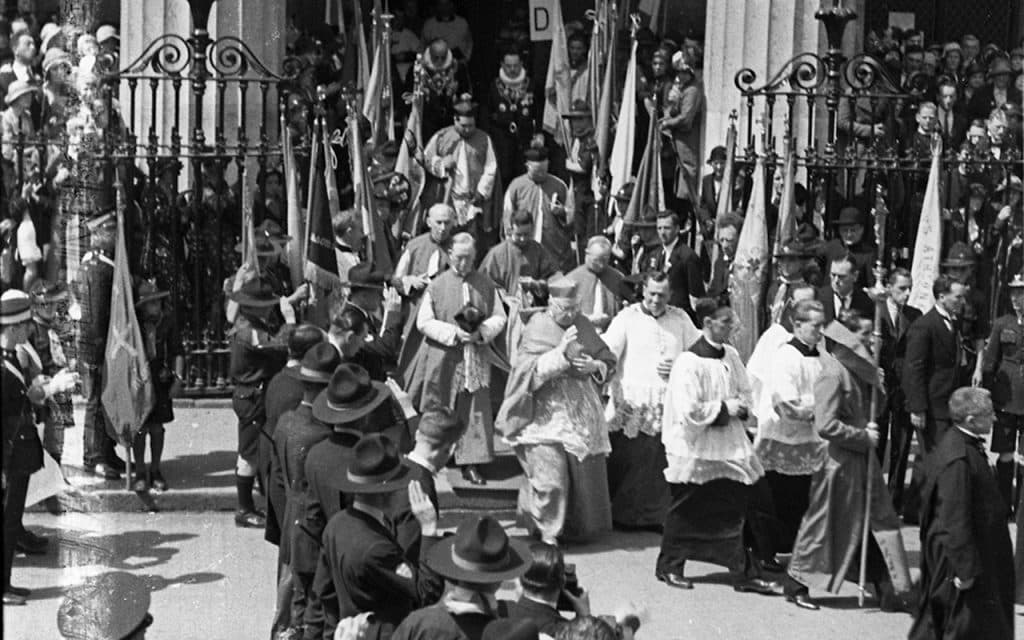With all of its ups and downs, life is often compared to a spinning wheel. For a group of West Cork women, who have been meeting every Tuesday for over ten years, Mary O’Brien finds that the spinning wheel weaves a bright story of friendship, where life’s challenges and highlights are shared over thread and tea.

Founded by Kilkenny native, Brigid O’Brien, the Mizen Spinning and Textiles group (MIST), now based out of Bank House in Ballydehob, is a group of mostly self-taught but enthusiastic textile producers from all walks of life who, one way or another now call West Cork home
A retired public health nurse, who went back to education later in life to study art and design in Skibbereen, Brigid was drawn to the art of spinning from her childhood memories of watching sheep shearing on the family farm. After purchasing a secondhand spinning wheel and loom, she and her friend Nora, an experienced commercial hand knitter, taught themselves how to use the equipment and spin raw wool with the help of YouTube. “The hand-to-eye coordination is a bit tricky so it took us a while to get it going,” shares Brigid.
After a series of demonstrations at agricultural shows, word spread and before too long others with a creative flair and a passion for textiles were drawn to join in. Today MIST is a group of 14 – a mix of Irish, English, German, Australian and Ukrainian nationalities.
Originally from Germany, Renate and her husband, attracted by the simple life while here on holiday, moved to Connemara in 1979 to take up sheep farming where Renate’s passion for wool and nature was born. They relocated to West Cork ten years ago.
Ever since she was a child, Sandy has loved making things, from knitting and crocheting clothes for her dolls to sewing clothes for herself as a teenager. In later years, she discovered felting and, since joining MIST, has learned to spin, dye and weave. She says she enjoys the energy of the group and has gained experience in working with all sorts of textiles.
Julia is a textile artist based in Schull, who works primarily with up-cycled and found fabrics creating work that responds to her surroundings. “I love anything to do with threads,” she says, as she sits, teaching herself to weave yarn using the branch of a tree. It’s the process rather than the finished product that drew her attention. “I’m not quite sure what it’s going to be yet,” she laughs.
After marrying a sheep farmer, Mary realised how undervalued wool is in Irish society. She makes beautiful shawls and cardigans.
A former librarian, Annie is a talented silk painter and lino printer, who has turned her hand to spinning and dying wool since joining the group three years ago. She proudly shows off her beautiful Norwegian spinning wheel, inherited from her mother.
Ukrainian Galyna shares how the group has become her Irish family. After arriving in Ireland with little more than two suitcases and some family photographs, the kindness shown her by these women has been a lifeline in a challenging time. “I always felt support and a genuine desire to help me,” she shares. “It brought me a sense of peace I hadn’t felt in so long.”
From Australia, Loretta moved to West Cork eight years ago and says it’s her forever home. “I want to get planted here, under a tree,” she laughs. The former nurse and academic aims to make practical pieces, from mostly ocean waste, that reflect the natural beauty of the ocean and other aspects of nature.
“A good friend once told me ‘Don’t think too much, just do it!’” says Kiki, who started off making traditional pattern quilts and taught herself all kinds of techniques to bring beautiful materials to life.
Since moving to West Cork, Anja has felt a draw to the people and the environment here. She recycles local materials wherever possible to create pieces that reflect nature.
The soft whirring of the spinning of the wheel contrasts with the friendly chatter of the women, as they work and swap stories and techniques.
Renate and Julia demonstrate carding, the process of separating fibres to prepare them for spinning in to yarn.
While the group is largely focused on their craft and camaraderie, their work exists in the shadow of a once-thriving wool industry in Ireland, particularly in West Cork.
“Historically, the region was home to a strong tradition of spinning and weaving,” explains Brigid. In the 18th and 19th centuries, cottage industries flourished as local women spun wool from native sheep, producing the yarn that fuelled Ireland’s once-bustling textile trade. Hand spun and woven wool was not only used for household needs but also exported, with Irish textiles gaining a reputation for quality and craftsmanship.
However, as industrialisation took hold and synthetic materials rose in popularity, the Irish wool industry declined.
“Farmers often struggle to find a viable market for their wool, with many resorting to discarding it,” says Brigid, who gets her wool from her brother, a sheep farmer.
Although Ireland has a rich history of wool production, the industry sadly remains largely underdeveloped, relying on groups like MIST to preserve and promote traditional techniques.
While they’re inspiring other groups to start up around West Cork – there’s now one in Bantry and some interest from Kinsale and Macroom – these weekly gatherings are about more than reviving an ancient craft. As they sit together turning raw wool into yarns, echoing the work of generations before them, the women weave a story of connection in an increasingly disconnected world.
MIST meets at Bank House in Ballydehob, every Tuesday from 2-4.30pm. Anyone is welcome to join.
The group will hold an exhibition of their work entitled ‘Heritage and Sustainability’. at Kinsale Library from April 16 to May 13 and have been invited to visit Macroom Library on April 16.
An exhibition of work by MIST member, Loretto, will open at Working Artists Studio in Ballydehob on Friday, April 4 at 6pm.



